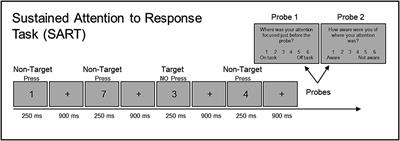Investigating the protective effects of mindfulness-based attention training on mind wandering in applied settings
Introduction: Mind wandering, a phenomenon in which attention drifts away from the task-at-hand, is associated with deleterious effects on performance and well-being.

As such, efforts to curb mind wandering are warranted. Recently, mindfulness training (MT) has been found to protect against mind wandering. Yet, many MT programs are at risk of falling off the implementation cliff due to challenges implementing these programs in applied settings. To mitigate against this, early-stage research in small convenience samples may be necessary to spur stakeholder engagement and collaboration. Herein, the effects of MT on mind wandering were examined via an internal meta-analysis of early-stage studies of a manualized, context-adaptable short-form MT program, referred to as Mindfulness-Based Attention Training (MBAT). Methods: Five longitudinal studies (N = 304) were conducted in a variety of organizational cohorts. Self-reported mind wandering and meta-awareness, as well as accuracy (A’) and response time variability (intra-individual coefficient of variation, ICV) during performance of the sustained attention to response task (SART) were assessed at baseline (T1) and 4 weeks later (T2) in MBAT and no-training participants. Results: Standardized mean change (SMC) from T1 to T2 significantly differed between MBAT and no-training groups for mind wandering (ΔSMC = −0.387, p < 0.001), meta-awareness (ΔSMC = −0.374, p < 0.001), and ICV (ΔSMC = −0.376, p = 0.043), suggesting potential protective effects in self-reported and performance-based metrics of mind wandering. Discussion: These results serve as preliminary proof-of-concept support for MBAT’s protective effects on mind wandering. Further, they suggest that MBAT is amenable to implementation across a variety of applied and organizational settings and warrants additional research employing larger sample sizes in randomized controlled designs..
Read the full article at the original website
References:
